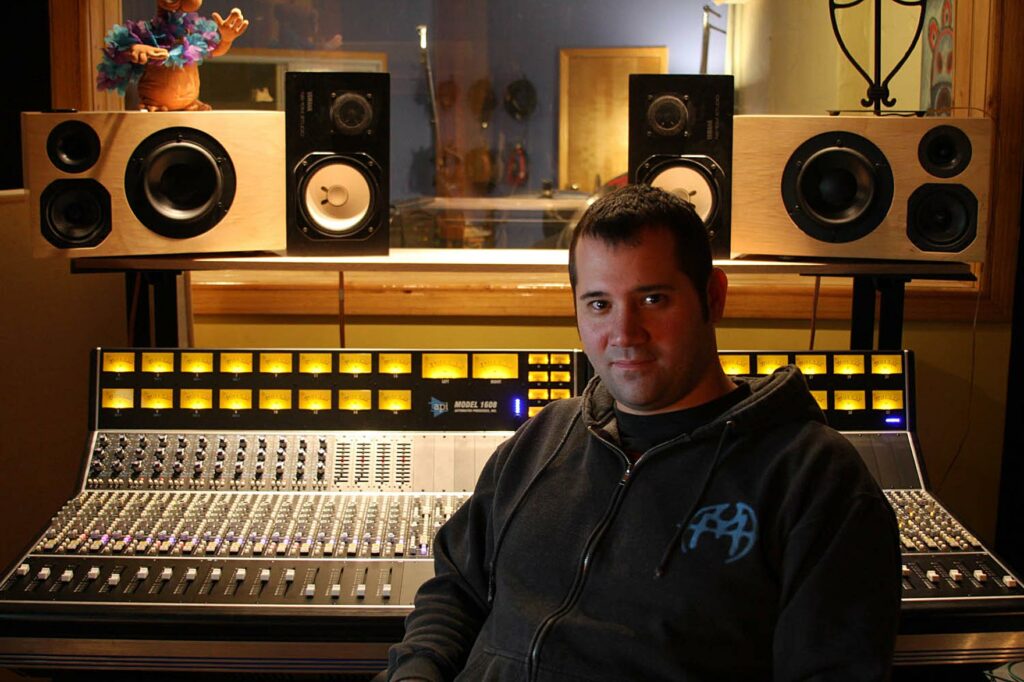Chicago, Illinois: March 2008:
Since opening I.V. Lab Studios two-and-a-half years ago, owner Manny Sanchez has been looking for a mixing console with character at a price that makes sense for a facility catering to local bands and small indie labels. When API launched the 1608 at the AES Convention last year Sanchez knew he'd found his console, and is now the proud owner of a 32-input version, the first to be installed in Chicago — or anywhere else for that matter.
"Ever since I opened, I've been looking for the right console at the right price," confirms Sanchez, whose I.V. Lab is located in an old 3,500 sq.-ft. bank building on the north side of Chicago. Sanchez has installed the 16-channel 1608 with a 16-channel expander in the studio's main room, which is in the former bank vault and features three-feet-thick cement walls.
"I got it in my head that I definitely did not want to get a console that didn't have a sound," explains Sanchez. "I use a 1970s Ampex MM1200 16-track tape machine, so I have no desire to make something sound clean." When he heard about the new 1608, "I said, wow, this might be within the price range that I can afford and, with it being an all-discrete console, still have a really good amount of character to it," he says.
The API 1608 incorporates the company's discrete electronics topology and is built to the same exacting standards as the flagship Vision and Legacy Series consoles. The standard 1608, with sixteen input channels, eight buses, eight aux sends, eight reverb returns and full center section facilities, includes a dozen 550A three-band equalizers and four 560 10-band graphic EQ modules with space available for eight additional 500 Series modules, a feature that Sanchez considers a definite advantage. "I just added two API 550b four-band EQs, two API 525 compressors, and a couple of other EQs," he reports. "I love the idea of the 1608 being a modular console that third party people can develop things for. I can put as much of that interesting stuff in it as I can and have two channels of this character, two channels of another character, and be able to choose the path that I want."
Sanchez says that he didn't even have to audition the console before putting a deposit down on one: "I had API mic pres, two 3124s, that I use religiously; those are the mic pres on the console. All my experience with all the API equipment that I've used has been really good."
Starting out as an intern with chief engineer Chris Shepard at the biggest studio in town, Chicago Recording Company, Sanchez then met Smashing Pumpkins main man Billy Corgan, for whom he worked for a couple of years before getting the idea to open his own studio. Bruce Breckenfeld, the chief technician at CRC, was brought in to design the rooms and wiring schemes at I.V. Lab. "He's a genius with acoustics," says Sanchez, adding, "Now I'm building a B room with a full-on control room and a nice sized booth. We've done it all the right way, we didn't cut any corners."
Installing the new API console now allows Sanchez to keep mix projects in-house, as his previous console wasn't up to the task, he reports. He is currently working on his fifth album with Chicago-based Umphrey's McGee, who are looking forward to mixing at I.V. Lab for the first time: "They're really excited because we'd been mixing their albums elsewhere and now we can do this one here. That's going to be a really fun thing for everyone."
Having maintained competitive pricing since opening, I.V. Lab has attracted a growing client base that also includes artists such as The Plain White T's, Rachael Yamagata, The Hush Sound, Patrick Stump (Fall Out Boy), Bound Stems, Cameron McGill, Ike Reilly, Dr. Manhattan and The Sapiens. "When we first opened up, it was $500 for a 12-hour day with me engineering. I'm not raising my rate. I don't think you can beat us on price point or quality," he says.
He continues, "Before we even got the console we'd been booked solid at least two, two-and-a-half months in advance." That has now increased to over three months as clients have rushed to book mix time on the API. "There's no studio that I've ever worked at that has ever been this busy. And lots of my business is repeat business — another thing I didn't see a lot of at my previous studios. It's shaping up to be a great year."
